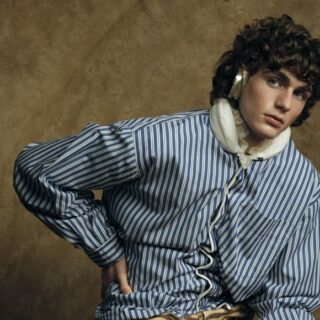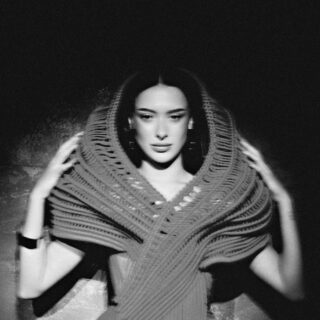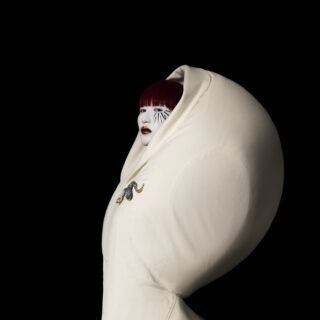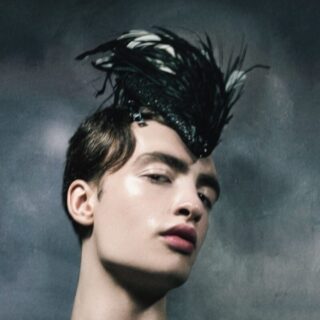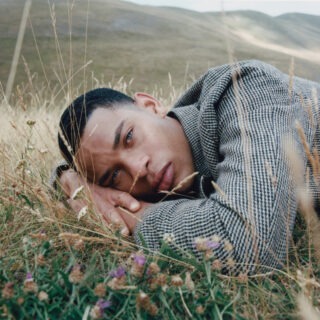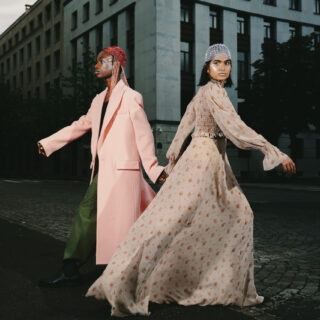photography. Vadym Yatsun
fashion. Ignacio De Tiedra
issue 5 – the unexpected
Could you share some insights into your background, particularly regarding your Swiss heritage?
Growing up in Bath, UK, with my Indian father and Swiss mother, both artists and older parents, I often felt like an outsider. Our home was filled with the vibrant aromas of Indian cooking, and our meals represented a fusion of British, Indian, and Italian influences, reflecting our multicultural environment. My Swiss mother facilitated connections to my heritage in French-speaking Switzerland, providing a sharp contrast to our English lifestyle. My parents celebrated our multiculturalism as a precious gift that offered diverse perspectives. My upbringing and travels have significantly shaped my views on equality, class, and cultural richness. While we sometimes didn’t seamlessly fit in, I treasure my eclectic background.
You just had a significant birthday. How has turning fifty changed your personal and professional perspectives?
I feel like when I hit 49, I suddenly started to panic about 50, but friends who’ve reached that point assure me it improves because you genuinely stop caring about others’ opinions. Professionally, sometimes as an actor, you feel like, what do I know? But teaching and talking with drama students highlighted that I have valuable life and professional experience to share. I’m thrilled seeing a new generation, especially women and people of colour, accessing opportunities I didn’t have. Post MeToo and Time’s Up, a wonderful sisterhood has emerged among women, transcending issues of sexual harassment and fostering mutual support and celebration in the arts and society. More opportunities for women are now recognized as essential, and I find this shift fantastic.
Has your passion for acting projects changed over time, and are you seeking diverse experiences, or do you still welcome all opportunities?
In the acting journey, expectations evolve. Initially, I thought I’d only pick the best projects, but soon realized such opportunities are rare and success is gradual. People advised it would take ten years to truly learn the craft even after three years in drama school, and this insight was invaluable. Saying yes to everything became my philosophy since there’s so much to learn from every opportunity. The size of the role isn’t the main factor anymore. I’ve explored various works, such as a pleasurable, non-commercial radio project with Toby Jones, adapting Italo Calvino, where I played numerous roles alongside remarkable people. Ultimately, if it involves amazing people and scripts, even with little pay, I’m all in because the experience and craftsmanship bring immense value.
Throughout your journey, did you encounter any unexpected events or experiences that significantly altered the trajectory of your career?
I landed a lead role in the film “Kamasutra” just fresh out of drama school, which was unexpected since I envisioned myself doing theatre, aiming for physical theatre at Jacques Lecoq. Unexpectedly, I was propelled into film, wrestling with having to adopt an Indian accent, spotlighting how the industry perceived me. An unforeseen pivotal moment was working with Harold Pinter; his powerful words, when spoken, transform and inform character creation in a uniquely profound way. Similar to how one connects with characters in a good book, each role I’ve undertaken has taught me something. Surprisingly, even a seemingly small role in “Game of Thrones” had huge repercussions due to its massive fan base, thrusting me into a spotlight, albeit not necessarily highlighting what I’d deem my best work. Life and career are full of these unexpected, defining moments.
Speaking of good books, how do you feel about the prestigious honour of being a judge for the Women’s Prize for Fiction?
I’ve read shortlisted works for the Women’s Prize for Fiction in recent years, and though I declined a judge’s role last year due to scheduling, I accepted this year despite my play involvement. Initiated 20-30 years ago to counter gender disparities in literary recognition— evident when only men were Booker Prize finalists— the Women’s Prize elevates and celebrates global women female writers, ensuring diverse voices, including those less known, are heard and acknowledged.
Will you be performing in Macbeth next?
We’re putting on Macbeth and touring with it, which is thrilling. Ralph Fiennes is playing Macbeth and it’s directed by the prolific director Simon Godwin, the artistic director of the Shakespeare Theatre Company. We’re deliberately avoiding being solely London centric because there’s a substantial audience and considerable enthusiasm for theatre elsewhere. Plus, I adore the idea of connecting with students since Macbeth is part of the GCSE curriculum. The play is impactful yet not overly long, and our hope is to draw in diverse audiences, perhaps those who typically might not have such experiences. Touring isn’t as prevalent as it once was, and we hope to bring back a bit of that magic, finally ending our journey in Washington, D.C. It’s all about reaching and impacting varied audiences, and I’m thrilled about it.
What advice would you share with new actors and those in their first decade of their career, based on your experiences and ongoing journey in the industry?
Saying yes to everything is key. It’s crucial to maintain self-awareness and the courage to be authentic, despite societal pressures to conform. Martha Graham’s quote really resonates with me— it speaks to maintaining an open channel to your own vitality and life force. Essentially, it tells us no artist is ever satisfied, and it’s not our business to judge our work, but to stay open and aware to our motivational urges. It’s this “divine dissatisfaction” that keeps us vibrant and alive. In my 50s, my new practice is to have the courage to fail because that’s where the magic happens. That alchemical transformation occurs when we dare to make mistakes and be truthful in our work, and investing ourselves fully into what we do makes our work genuinely interesting and connects deeper with others.
photography + retouch
creative direction. Vadym Yatsun
fashion. Ignacio de Tiedra
art direction. Ignacio de Tiedra + Margo Mayor
talent. Indira Varma
set designer. Sam Edyn
hair. Paul Donavan
make up. Justine Jenkins
nails. Mica Hendricks
photography assistant. Simeon Asenov, Leo Corfu
set designer assistant. Jeremy Rwakasiisi
fashion assistant. Enol Garcia Granda
hair assistant. Jessica Kell
© Schön! Switzerland. All rights reserved.

